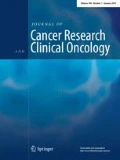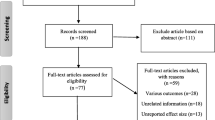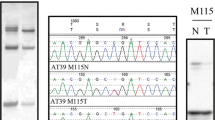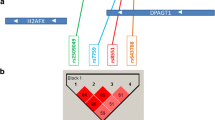Abstract
Purpose
Various ATM (ataxia telangiectasia-mutated) mutations and polymorphisms have been reported to be associated with an increased breast cancer risk. Recent studies have produced contradictory results regarding the association between ATM genetic variants and breast cancer risk.
Materials and methods
The common ATM polymorphism 5557G>A (p.D1853N) (rs1801516), previously suggested to be associated with bilateral breast cancer, was analyzed using real-time PCR in 514 unselected patients with breast cancer and 511 age-matched healthy control individuals. DNA was obtained from peripheral blood draw.
Results
The ATM genotype was weakly associated with the risk for breast cancer (P = 0.04 for the overall test). The odds ratio for women with a heterozygous genotype was 0.70 (95% CI, 0.52–0.94) and for the homozygous variant 0.63 (95% CI, 0.27–1.49). Disease-free survival and overall survival showed no significant association with specific genotypes.
Conclusions
The results of this study might suggest a minor association between polymorphism 5557G>A and a reduced risk of breast cancer


Similar content being viewed by others
References
Angele S, Romestaing P, Moullan N, Vuillaume M, Chapot B, Friesen M, Jongmans W, Cox DG, Pisani P, Gerard JP, Hall J (2003) ATM haplotypes and cellular response to DNA damage: association with breast cancer risk and clinical radiosensitivity. Cancer Res 63:8717–8725
Antoniou AC, Easton DF (2003) Polygenic inheritance of breast cancer: implications for design of association studies. Genet Epidemiol 25:190–202
Bakkenist CJ, Kastan MB (2004) Initiating cellular stress responses. Cell 118:9–17
Bebb DG, Yu Z, Chen J, Telatar M, Gelmon K, Phillips N, Gatti RA, Glickman BW (1999) Absence of mutations in the ATM gene in forty-seven cases of sporadic breast cancer. Br J Cancer 80:1979–1981
Bernstein JL, Teraoka S, Southey MC, Jenkins MA, Andrulis IL, Knight JA, John EM, Lapinski R, Wolitzer AL, Whittemore AS, West D, Seminara D, Olson ER, Spurdle AB, Chenevix-Trench G, Giles GG, Hopper JL, Concannon P (2006) Population-based estimates of breast cancer risks associated with ATM gene variants c.7271T>G and c.1066–6T>G (IVS10-6T>G) from the Breast Cancer Family Registry. Hum Mutat 27:1122–1128
Blamey RW, Cataliotti L (2006) EUSOMA accreditation of breast units. Eur J Cancer 42:1331–1337
Borresen AL, Andersen TI, Tretli S, Heiberg A, Moller P (1990) Breast cancer and other cancers in Norwegian families with ataxia-telangiectasia. Genes Chromosomes Cancer 2:339–340
Broeks A, Urbanus JH, Floore AN, Dahler EC, Klijn JG, Rutgers EJ, Devilee P, Russell NS, van Leeuwen FE, van’t Veer LJ (2000) ATM-heterozygous germline mutations contribute to breast cancer-susceptibility. Am J Hum Genet 66:494–500
Cavaciuti E, Lauge A, Janin N, Ossian K, Hall J, Stoppa-Lyonnet D, Andrieu N (2005) Cancer risk according to type and location of ATM mutation in ataxia-telangiectasia families. Genes Chromosomes Cancer 42:1–9
Dork T, Bendix R, Bremer M, Rades D, Klopper K, Nicke M, Skawran B, Hector A, Yamini P, Steinmann D, Weise S, Stuhrmann M, Karstens JH (2001) Spectrum of ATM gene mutations in a hospital-based series of unselected breast cancer patients. Cancer Res 61:7608–7615
Einarsdottir K, Rosenberg LU, Humphreys K, Bonnard C, Palmgren J, Li Y, Li Y, Chia KS, Liu ET, Hall P, Liu J, Wedren S (2006) Comprehensive analysis of the ATM, CHEK2 and ERBB2 genes in relation to breast tumour characteristics and survival: a population-based case–control and follow-up study. Breast Cancer Res 8:R67
Eyfjord JE, Bodvarsdottir SK (2005) Genomic instability and cancer: networks involved in response to DNA damage. Mutat Res 592:18–28
FitzGerald MG, Bean JM, Hegde SR, Unsal H, MacDonald DJ, Harkin DP, Finkelstein DM, Isselbacher KJ, Haber DA (1997) Heterozygous ATM mutations do not contribute to early onset of breast cancer. Nat Genet 15:307–310
Gatti RA, Tward A, Concannon P (1999) Cancer risk in ATM heterozygotes: a model of phenotypic and mechanistic differences between missense and truncating mutations. Mol Genet Metab 68:419–423
Heikkinen K, Rapakko K, Karppinen SM, Erkko H, Nieminen P, Winqvist R (2005) Association of common ATM polymorphism with bilateral breast cancer. Int J Cancer 116:69–72
Kurz EU, Lees-Miller SP (2004) DNA damage-induced activation of ATM and ATM-dependent signaling pathways. DNA Repair (Amst) 3:889–900
Langholz B, Bernstein JL, Bernstein L, Olsen JH, Borresen-Dale AL, Rosenstein BS, Gatti RA, Concannon P (2006) On the proposed association of the ATM variants 5557G>A and IVS38-8T>C and bilateral breast cancer. Int J Cancer 119:724–725
Olsen JH, Hahnemann JM, Borresen-Dale AL, Brondum-Nielsen K, Hammarstrom L, Kleinerman R, Kaariainen H, Lonnqvist T, Sankila R, Seersholm N, Tretli S, Yuen J, Boice JD Jr, Tucker M (2001) Cancer in patients with ataxia-telangiectasia and in their relatives in the nordic countries. J Natl Cancer Inst 93:121–127
Olsen JH, Hahnemann JM, Borresen-Dale AL, Tretli S, Kleinerman R, Sankila R, Hammarstrom L, Robsahm TE, Kaariainen H, Bregard A, Brondum-Nielsen K, Yuen J, Tucker M (2005) Breast and other cancers in 1,445 blood relatives of 75 Nordic patients with ataxia telangiectasia. Br J Cancer 93:260–265
Platzer M, Rotman G, Bauer D, Uziel T, Savitsky K, Bar-Shira A, Gilad S, Shiloh Y, Rosenthal A (1997) Ataxia-telangiectasia locus: sequence analysis of 184 kb of human genomic DNA containing the entire ATM gene. Genome Res 7:592–605
Prokopcova J, Kleibl Z, Banwell CM, Pohlreich P (2007) The role of ATM in breast cancer development. Breast Cancer Res Treat 104(2):121–128
Ralhan R, Kaur J, Kreienberg R, Wiesmuller L (2007) Links between DNA double strand break repair and breast cancer: accumulating evidence from both familial and nonfamilial cases. Cancer Lett 248(1):1–17
Renwick A, Thompson D, Seal S, Kelly P, Chagtai T, Ahmed M, North B, Jayatilake H, Barfoot R, Spanova K, McGuffog L, Evans DG, Eccles D, Easton DF, Stratton MR, Rahman N (2006) ATM mutations that cause ataxia-telangiectasia are breast cancer susceptibility alleles. Nat Genet 38:873–875
Shiloh Y (2003) ATM and related protein kinases: safeguarding genome integrity. Nat Rev Cancer 3:155–168
Shiloh Y (2006) The ATM-mediated DNA-damage response: taking shape. Trends Biochem Sci 31:402–410
Stredrick DL, Garcia-Closas M, Pineda MA, Bhatti P, Alexander BH, Doody MM, Lissowska J, Peplonska B, Brinton LA, Chanock SJ, Struewing JP, Sigurdson AJ (2006) The ATM missense mutation p.Ser49Cys (c.146C>G) and the risk of breast cancer. Hum Mutat 27:538–544
Swift M, Morrell D, Cromartie E, Chamberlin AR, Skolnick MH, Bishop DT (1986) The incidence and gene frequency of ataxia-telangiectasia in the United States. Am J Hum Genet 39:573–583
Swift M, Reitnauer PJ, Morrell D, Chase CL (1987) Breast and other cancers in families with ataxia-telangiectasia. N Engl J Med 316:1289–1294
Swift M, Morrell D, Massey RB, Chase CL (1991) Incidence of cancer in 161 families affected by ataxia-telangiectasia. N Engl J Med 325:1831–1836
Teraoka SN, Malone KE, Doody DR, Suter NM, Ostrander EA, Daling JR, Concannon P (2001) Increased frequency of ATM mutations in breast carcinoma patients with early onset disease and positive family history. Cancer 92:479–487
Thompson D, Duedal S, Kirner J, McGuffog L, Last J, Reiman A, Byrd P, Taylor M, Easton DF (2005) Cancer risks and mortality in heterozygous ATM mutation carriers. J Natl Cancer Inst 97:813–822
Tommiska J, Jansen L, Kilpivaara O, Edvardsen H, Kristensen V, Tamminen A, Aittomaki K, Blomqvist C, Borresen-Dale AL, Nevanlinna H (2006) ATM variants and cancer risk in breast cancer patients from Southern Finland. BMC Cancer 6:209
Uziel T, Savitsky K, Platzer M, Ziv Y, Helbitz T, Nehls M, Boehm T, Rosenthal A, Shiloh Y, Rotman G (1996) Genomic Organization of the ATM gene. Genomics 33:317–320
Wacholder S, Chanock S, Garcia-Closas M, El Ghormli L, Rothman N (2004) Assessing the probability that a positive report is false: an approach for molecular epidemiology studies. J Natl Cancer Inst 96:434–442
Author information
Authors and Affiliations
Corresponding author
Rights and permissions
About this article
Cite this article
Schrauder, M., Frank, S., Strissel, P.L. et al. Single nucleotide polymorphism D1853N of the ATM gene may alter the risk for breast cancer. J Cancer Res Clin Oncol 134, 873–882 (2008). https://doi.org/10.1007/s00432-008-0355-9
Received:
Accepted:
Published:
Issue Date:
DOI: https://doi.org/10.1007/s00432-008-0355-9




